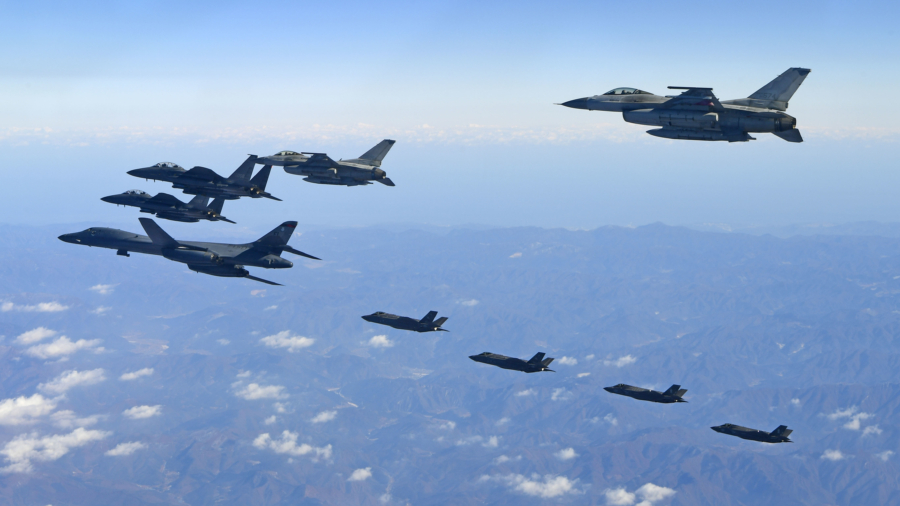Two U.S. B-1B heavy bombers joined large-scale combat drills over SouthKorea on Thursday amid warnings from North Korea that the exercises and U.S. threats have made the outbreak of war “an established fact.”
The annual U.S.-South Korean “Vigilant Ace” exercises feature 230 aircraft, including some of the most advanced U.S. stealth warplanes, and come a week after North Korea tested its most powerful intercontinental ballistic missile (ICBM) to date, which it says can reach all of the United States.
North Korea‘s foreign ministry blamed the drills and “confrontational warmongering” by U.S. officials for making war inevitable.
“The remaining question now is: when will the war break out?” it said in a statement. “We do not wish for a war but shall not hide from it.”


China, North Korea‘s neighbor and lone major ally, again urged calm and said war was not the answer, while Russian Foreign Minister Sergei Lavrov said North Korea wanted direct talks with the United States to seek guarantees on its security, something Moscow was ready to facilitate.
Russian Foreign Minister Sergei Lavrov told U.S. Secretary of State Rex Tillerson on the sidelines of a conference in Vienna that U.S. military exercises and aggressive rhetoric were causing an unacceptable escalation in tension.
U.S. State Department spokeswoman Heather Nauert said direct talks with North Korea were “not on the table until they are willing to denuclearize.”
“It is something that Russia says it agrees with; it is something China has said it agrees with, and many other nations around the world as well,” she told a regular briefing.
Nauert said North Korea was “not showing any interest in sitting down and having any kind of serious conversations when they continue to fire off ballistic missiles.”
Another State Department spokesperson, Justin Higgins, said it was not enough for North Korea to freeze its nuclear program, and it “must be prepared to come to the table ready to chart a course to ‘cease and roll back'” that program.
Tensions have risen markedly in recent months over North Korea‘s development, in defiance of repeated rounds of U.N. sanctions, of nuclear-tipped missiles capable of reaching the United States.
Last week’s missile test prompted a U.S. warning that North Korea‘s leadership would be “utterly destroyed” if war were to break out. The Pentagon has mounted repeated shows of force after North Korean tests.

Strategic Bombers
In September, after North Korea‘s sixth and largest nuclear test, B-1Bs flew further north along North Korea‘s coast than at any time in the past 17 years. The sortie prompted Pyongyang’s foreign minister to warn that U.S. bombers could be shot down even if they did not nter North Korean airspace.
Yang Uk, a senior fellow at the Korea Defence and Security Forum, said B-1Bs would be key to any strike targeting major North Korean facilities.
“B-1B bombers have been regularly dispatched to the Korean peninsula over the past years; however, it seems that the U.S. Air Force might have enhanced its training to better prepare for actual warfare,” he said.
Both sides insist they don’t want war, while saying they will act to defend themselves.

U.S. national security adviser H.R. McMaster said at the weekend the possibility of war was “increasing every day.” He said Trump was prepared to take action against North Korea but was working to convince China, Russia and others to do more to press Pyongyang to get it to give up its weapons programs.
U.S. Republican Senator Lindsey Graham urged the Pentagon on Sunday to start moving U.S. military dependents out of South Korea, saying conflict with North Korea was getting close.
The Pentagon said it has “no intent” to move out any dependants.
On Wednesday, the U.S. ambassador to the United Nations, Nikki Haley, raised doubts about U.S. participation in the Olympic Winter Games in South Korea in February, telling Fox News that Washington was concerned about its citizens.
However, White House Press Secretary Sarah Sanders said on Thursday the United States looked forward to participating in the games and was engaged with South Korea and other nations to secure the venues.

North Korea regularly threatens to destroy South Korea and the United States and says its weapons programs are necessary to counter U.S. aggression. The United States stations 28,500 troops in the South, a legacy of the 1950-53 Korean War.
The rising tensions coincide with a rare visit to North Korea by United Nations political affairs chief Jeffrey Feltman, the highest-level U.N. official to visit North Korea since 2012.
Some analysts and diplomats hope his visit could spark a U.N.-led effort to defuse tensions. Feltman met North Korean Foreign Minister Ri Yong Ho on Thursday, North Korea‘s official KCNA news agency said.

By Soyoung Kim and Heekyong Yang


